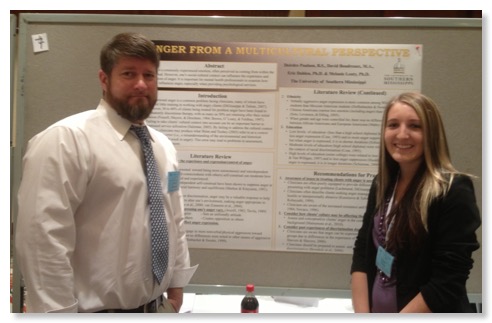
Director: Eric R. Dahlen, Ph.D.
Daniel Deason Proposes Thesis on Personality and Relational Aggression
09/18/13 Aggression
Daniel Deason, a doctoral student in his second year, successfully proposed his master's thesis today. He did a great job presenting his study and obtained approval from his committee to move forward.
Daniel's thesis, Personality and Relational Aggression in College Students: The Role of Social Anxiety and Rejection Sensitivity, will examine the utility of the Five Factor Model (FFM) of personality, social anxiety, and rejection sensitivity in predicting relational aggression between peers and romantic partners. We expect that some of the Big Five personality factors will predict relational aggression but that social anxiety and rejection sensitivity will explain additional variance in relational aggression beyond the contribution of the FFM.
Daniel's thesis, Personality and Relational Aggression in College Students: The Role of Social Anxiety and Rejection Sensitivity, will examine the utility of the Five Factor Model (FFM) of personality, social anxiety, and rejection sensitivity in predicting relational aggression between peers and romantic partners. We expect that some of the Big Five personality factors will predict relational aggression but that social anxiety and rejection sensitivity will explain additional variance in relational aggression beyond the contribution of the FFM.
Predictors of Binge Eating in College Women
07/25/13 Anger
Emily Prather proposed her dissertation today, Predictors of Binge Eating in College Women. She did a great job with her proposal, and her dissertation committee approved her plan.
Emily's study aims to clarify the possible roles of trait anger, anger suppression, impulsivity, and emotion regulation in binge eating among college women. Data collection will begin in the fall. It is hoped that her study will inform our understanding of binge eating.
Emily's study aims to clarify the possible roles of trait anger, anger suppression, impulsivity, and emotion regulation in binge eating among college women. Data collection will begin in the fall. It is hoped that her study will inform our understanding of binge eating.
Charles Spielberger, RIP
06/13/13 Anger
I am sad to report that Dr. Charles Spielberger, author of the State-Trait Anger Expression Inventory-2, passed away yesterday. We in the lab are indebted to Dr. Spielberger in more ways than I can mention. Without his measures, theories, considerable body of scholarship, and assistance over the years, much of our work on anger would not have been possible. He will be missed.
###
Charles Donald Spielberger, PhD (born 1927) passed away June 11, 2013. Dr. Spielberger was a clinical and community psychologist best known for his work on personality and health. He was past president of the American Psychological Association and an emeritus member of the Psychology Department at the University of South Florida, where he served as Department Chair. Dr. Spielberger was a USF Distinguished Research Professor, the highest academic honor bestowed by the University. An internationally acclaimed scholar, he wrote over 460 professional publications. He was also a mentor to many graduate students, and provided gifts to the USF Foundation to support graduate students through scholarships. In recognition for his work, Dr. Spielberger received numerous awards, including the American Psychological Association Award for Distinguished Contributions to the International Advancement of Psychology and the Gold Medal Award for Life Achievement in the Application of Psychology from the American Psychological Foundation. After his official retirement, he remained an active researcher, running the Center for Research in Behavioral Medicine & Health Psychology.
Before coming to USF, he taught at Vanderbilt University (1962-1967) and Florida State University (1967-1972). He also served as a visiting faculty at the University of Santiago de Compostela, Spain, and the Netherlands Institute for Advanced Study. Dr. Spielberger served in the U.S. Naval Reserve from 1946 to 1979, retiring at the rank of Commander. He earned a B.S. in chemistry from the Georgia Institute of Technology and a Ph.D. in psychology from the University of Iowa.
Dr. Spielberger is survived by his wife, Carol, and his son, Nicholas.
Prepared by Dr. Michael Brannick, Chair, Department of Psychology, University of South Florida
###
Charles Donald Spielberger, PhD (born 1927) passed away June 11, 2013. Dr. Spielberger was a clinical and community psychologist best known for his work on personality and health. He was past president of the American Psychological Association and an emeritus member of the Psychology Department at the University of South Florida, where he served as Department Chair. Dr. Spielberger was a USF Distinguished Research Professor, the highest academic honor bestowed by the University. An internationally acclaimed scholar, he wrote over 460 professional publications. He was also a mentor to many graduate students, and provided gifts to the USF Foundation to support graduate students through scholarships. In recognition for his work, Dr. Spielberger received numerous awards, including the American Psychological Association Award for Distinguished Contributions to the International Advancement of Psychology and the Gold Medal Award for Life Achievement in the Application of Psychology from the American Psychological Foundation. After his official retirement, he remained an active researcher, running the Center for Research in Behavioral Medicine & Health Psychology.
Before coming to USF, he taught at Vanderbilt University (1962-1967) and Florida State University (1967-1972). He also served as a visiting faculty at the University of Santiago de Compostela, Spain, and the Netherlands Institute for Advanced Study. Dr. Spielberger served in the U.S. Naval Reserve from 1946 to 1979, retiring at the rank of Commander. He earned a B.S. in chemistry from the Georgia Institute of Technology and a Ph.D. in psychology from the University of Iowa.
Dr. Spielberger is survived by his wife, Carol, and his son, Nicholas.
Prepared by Dr. Michael Brannick, Chair, Department of Psychology, University of South Florida
Attitudes Toward Anger Management Scale Soon to be Published
05/03/13 Anger
Evidence-based treatments for clinically dysfunctional anger have been available for some time; however, they are often designed for highly motivated individuals who acknowledge having a problem with anger and a desire for assistance. While some individuals with anger problems are motivated, many others are ambivalent about seeking or actively participating in treatment. The importance of assessing treatment motivation is evident to clinicians who provide anger management services, and measures of treatment readiness are beginning to appear.
Attitudes toward anger management services are likely to influence one's willingness to seek professional help for dysfunctional anger and impact the nature of the working alliance. Assessing attitudes toward these services may help us identify obstacles to help seeking and better engage angry clients early in treatment.
A paper based on David Boudreaux's master's thesis describing the development of the Attitudes Toward Anger Management Scale (ATAMS), a new measure designed to assess attitudes toward seeking professional help with problem anger, was just accepted for publication in Measurement and Evaluation in Counseling and Development. The paper describes the development and initial validation of the measure.
Additional work on the ATAMS is needed before the instrument can be recommended for use in clinical settings, but we are encouraged by the initial results and will soon begin collecting additional data.
The citation is below, and the paper is available in pre-release .pdf format by clicking on the title:
Boudreaux, D. J., Dahlen, E. R., Madson, M. B., Bullock-Yowell, E. (in press). Attitudes toward anger management scale: Development and initial validation. Measurement and Evaluation in Counseling and Development.
Attitudes toward anger management services are likely to influence one's willingness to seek professional help for dysfunctional anger and impact the nature of the working alliance. Assessing attitudes toward these services may help us identify obstacles to help seeking and better engage angry clients early in treatment.
A paper based on David Boudreaux's master's thesis describing the development of the Attitudes Toward Anger Management Scale (ATAMS), a new measure designed to assess attitudes toward seeking professional help with problem anger, was just accepted for publication in Measurement and Evaluation in Counseling and Development. The paper describes the development and initial validation of the measure.
Additional work on the ATAMS is needed before the instrument can be recommended for use in clinical settings, but we are encouraged by the initial results and will soon begin collecting additional data.
The citation is below, and the paper is available in pre-release .pdf format by clicking on the title:
Boudreaux, D. J., Dahlen, E. R., Madson, M. B., Bullock-Yowell, E. (in press). Attitudes toward anger management scale: Development and initial validation. Measurement and Evaluation in Counseling and Development.
Anger and Culture at SEPA
03/18/13 Anger

Here are David Boudreaux and Deirdre Paulson at the 2013 Southeastern Psychological Association (SEPA) conference in Atlanta with their poster, Anger From a Multicultural Perspective. Deirdre works on Dr. Melanie Leuty's Work & Occupations Research Collaboration Team. This poster was a great example of productive collaboration across different research labs in our program.
Lab Welcomes Two New Doctoral Students
02/18/13 About
The Anger and Traffic Psychology Lab is pleased to welcome two new doctoral students for the Fall 2013 academic term.
Caitlin Clark is a master's student currently working in the lab who joined us in 2011 from Georgia College & State University. She plans to continue her research on aggression and hopes to broaden her focus beyond parenting-related variables. Niki Knight is completing her bachelor's degree at the University of Arkansas at Little Rock. Her interests make her a good fit for the lab.
Congratulations to Caitlin and Niki! We look forward to working with you.
Caitlin Clark is a master's student currently working in the lab who joined us in 2011 from Georgia College & State University. She plans to continue her research on aggression and hopes to broaden her focus beyond parenting-related variables. Niki Knight is completing her bachelor's degree at the University of Arkansas at Little Rock. Her interests make her a good fit for the lab.
Congratulations to Caitlin and Niki! We look forward to working with you.
